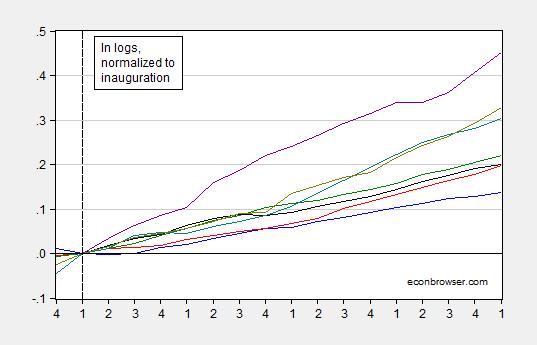What are these series?
(Not) The Leader of the Pack, Again: Wisconsin and Her Neighbors
Political Calculations criticizes me for comparing Wisconsin economic performance against Minnesota, but not other neighbors.
Normally, we’re entertained by Chinn’s analysis, since it frequently involves comparisons of the job growth between Wisconsin and its western neighbor Minnesota since Walker was sworn into office in January 2011, which we find funny because of all the states surrounding Wisconsin, the composition of Wisconsin’s economy is much less similar to Minnesota than it is to any of the states with which the state shares waterfront footage on Lake Michigan, which is something that one might think an economics professor at the University of Wisconsin-Madison would know.
[Update, 3/1] I have calculated a similarity index for MN, IL, MI vs. WI, based on output composition. It’s an unweighted measure of absolute sector differences, (Σ|xWI-xi|)/n . The indices are 0.010, 0.013, 0.007, for MN, IL, MI, respectively. In other words, MI is the most similar to WI, MN next. And, interestingly, MI far outpaces WI, in Figure 1 below.
Continue reading
Working with Qualitative Variables: Correlation, Causation, and Third Factors
I am fascinated by maps, including maps of the United States which display the geographic variation of institutional features. But qualitative features, such as institutions or laws, cannot be directly subjected quantitative analysis. Fortunately, as I’ve been discussing in my intro econometrics class, one can convert qualitative data into quantitative data by use of dummy variables, i.e., variables that take on a value of 1 or 0 (one could have ordinal values as well, but I’ll skip that aspect today).
Guest Contribution: “1997: The Relevant Threshold in the US Current Account”
Today we are fortunate to have a guest contribution written by Roberto Duncan, assistant professor of economics at Ohio University.
The Congressional Budget Office at 40
The CBO has been providing nonpartisan budgetary and economic analyses for four decades. Whether that continues depends upon the willingness of leaders in Congress believe in the worth of serious analysis (see here for doubts). For now, we look back and (hopefully) forward, at events today. Yesterday, a forum at the Brookings Institution presented some additional views. Director Doug Elmendorf blogs on the anniversary today.
Audit the Fed
Senator Rand Paul (R-KY) has gathered significant bipartisan support for the Federal Reserve Transparency Act of 2015, his proposal for more audits of the Fed. I’ve been trying to understand why any sensible person would think this is a good idea.
Continue reading
All the Governor’s Men (Economists)
Paul Krugman notes Governor Walker’s advisers on economics at a recent meeting are Larry Kudlow, Stephen Moore and Arthur Laffer. These folks make appearances in the Econbrowser archives.
Governor Walker Proposes to Restructure Debt Thereby Increasing Total Taxpayer Cost
As the state’s fiscal position becomes more dire, in large part due to the tax cuts implemented last year, Governor Walker proposes to delay some debt payments.
The Economic Report of the President, 2015
The entire report was released today, covering the “…progress of the recovery and explores the long-term factors that drive middle-class incomes,…the macroeconomic performance of the U.S. economy during 2014, …the opportunities and challenges facing the U.S. labor market, …how American family lives have changed over the last half-century and the implications of these changes for our labor market, …productivity growth with an examination of business tax reform, ..the profound transformation of the U.S. energy sector” and “…the United States in the context of the global economy.”
CEA Chair Jason Furman, CEA Members Maurice Obstfeld, and Betsey Stevenson summarize the report’s findings here.
Guest Contribution: Long-Term Effects of the Great Recession
Today, we’re fortunate to have David Papell and Ruxandra Prodan, Professor of Economics and Clinical Assistant Professor of Economics, respectively, at the University of Houston, as Guest Contributors.
